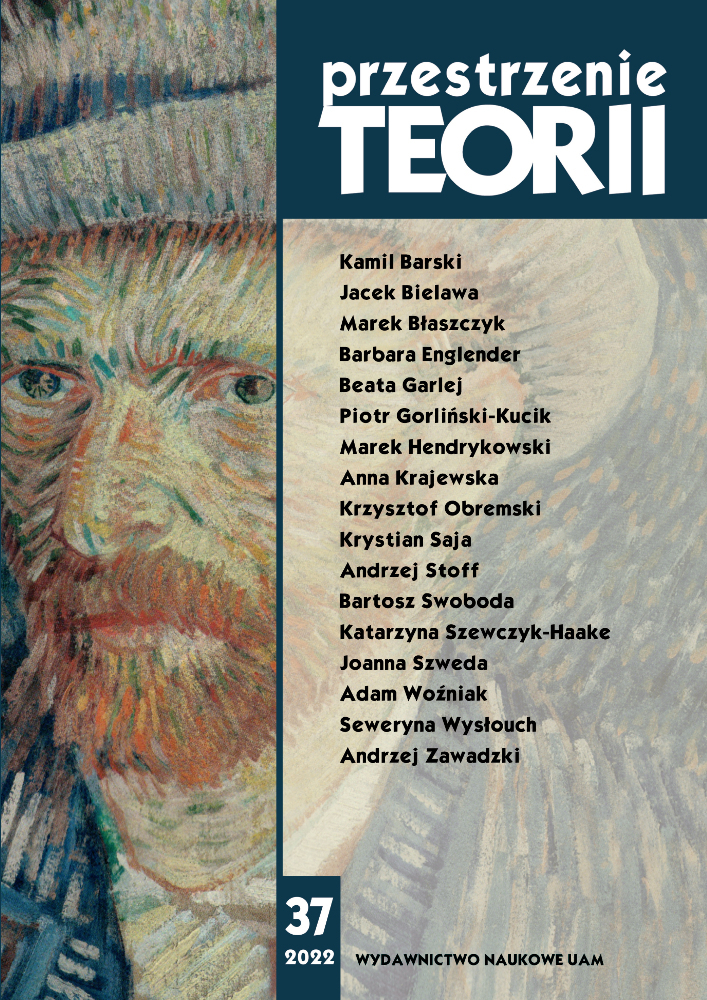Abstract
The paper is an attempt to interpret Magdalena Tulli’s novels in the context of the immunological paradigm. Immunological threads are traced on three levels: firstly, in the context of the communities described in Sny i kamienie [Dreams and stones], Skaza [Flaw] and W czerwieni [In Red]; secondly, with regard to the narrative constantly encountering problems such as ‘unwanted threads’ that degenerate the stories and prevent the narrative from bringing them to an end. Thirdly, in the context of post-memory, that is, a memory with its roots extending beyond the experiences of the subject. According to the thesis she puts forward, Tulli activates the immunological discourse on these three levels.
References
Agamben G., Homo Sacer: suwerenna władza i nagie życie, przeł. M. Salwa, Warszawa 2008.
Arendt H., Korzenie totalitaryzmu, przeł. M. Szawiel, D. Grinberg, Warszawa 1993.
Bauman Z., Praca, konsumpcjonizm i nowi ubodzy, Kraków 2006.
Bauman Z., Wieloznaczność nowoczesna. Nowoczesność wieloznaczna, Warszawa 1995.
Czapliński P., Państwo bez wstrętu, „Teksty Drugie” 2016, nr 1, s. 108–125. https://doi.org/10.18318/td.2016.1.7
Descartes R., Człowiek: opis ciała ludzkiego, przeł. A. Bednarczyk, Warszawa 1989.
Dzika-Jurek K., „Problem ciężaru”. Melancholia w twórczości Magdaleny Tulli, Katowice 2014, s. 94, <https://sbc.org.pl/dlibra/docmetadata?showContent=true&id=139135> [dostęp: 2.05.2021].
Dzika-Jurek K., „Setka szarych palt”. (Nie)świadomość Zagłady w powieści Skaza Magdaleny Tulli, „Teksty Drugie” 2013, nr 5, s. 25–41.
Esposito R., Bios. Biopolitics and philosophy, transl. T. Campbell, London 2008.
Esposito R., Communitas: the Origin and Destiny of Community, transl. T. Campbell, Stanford 2017.
Esposito R., Immunitas. The protection and negation of life, transl. Z. Hanafi, Cambridge 2012.
Filoni M., Anatomia oblężenia. Strach w mieście, przeł. J. Ugniewska, Warszawa 2020.
Foucault M., Bezpieczeństwo, terytorium, populacja, przeł. M. Herer, Warszawa 2010.
Foucault M., Historia seksualności, przeł. B. Banasiak, T. Komendant, K. Matuszewski, Warszawa 1994.
Foucault M., Trzeba bronić społeczeństwa, przeł. M. Kowalska, Warszawa 1998.
Hirsch M., Żałoba i postpamięć, przeł. K. Bojarska, [w:] Teoria wiedzy o przeszłości na tle współczesnej humanistyki. Antologia, red. E. Domańska, Poznań 2010.
Hobbes T., Lewiatan, czyli materia, forma i władza państwa kościelnego i świeckiego, przeł. Cz. Znamierowski, Warszawa 2005.
Klein J., Immunology: the Science of Self-Nonself Dis-crimination, New York 1982.
Kuchta A., Wobec postpamięci, Kraków 2020.
La Mettrie J., Człowiek-maszyna, przeł. S. Rudniański, Warszawa 2011.
Mackiewicz J., Nie trzeba głośno mówić, London 1985.
Madajczyk P., Marzenie o narodzie doskonałym. Między biopolityką a etnopolityką, Warszawa 2017. https://doi.org/10.35757/RPN.2016.24.14
Ratajczak M., Negatywność i bios politikos. Translacja tego, co polityczne, we współczesnej włoskiej filozofii politycznej, „Politeja” 2009, nr 9 (39), s. 111–140. https://doi.org/10.12797/Politeja.12.2015.39.06
Ratajczak M., Poza paradygmat immunizacji, „Praktyka Teoretyczna” 2011, nr 1–2, <https://pressto.amu.edu.pl/index.php/prt/article/view/2702> [dostęp: 30.04.2021].
Schmitt C., Pojęcie polityczności, [w:] tegoż, Teologia polityczna i inne pisma, przeł. M.A. Cichocki, Warszawa 2012.
Schmitt C., Nomos Ziemi, przeł. K. Wudarska, Warszawa 2019.
Tippner A., Sensing the meaning, working towards the facts: drugie pokolenie a pamięć o Zagładzie w tekstach Bożeny Keff, Magdaleny Tulli i Agaty Tuszyńskiej, „Teksty Drugie” 2016, nr 1, s. 68–87. https://doi.org/10.18318/td.2016.1.5
Tulli M., Skaza, Warszawa 2006.
Tulli M., Sny i kamienie, Warszawa 1999.
Tulli M., Szum, Kraków 2014.
Tulli M., Tryby, Warszawa 2003.
Tulli M., W czerwieni, Warszawa 1998.
Tulli M., Włoskie szpilki, Warszawa 2014.
Tuszyńska A., Rodzinna historia lęku, Kraków 2005.
License

This work is licensed under a Creative Commons Attribution-NonCommercial-NoDerivatives 4.0 International License.
Authors
Authors of texts accepted for publication in Przestrzenie Teorii are required to complete, sign and return to the editor's office the Agreement for granting a royalty-free license to works with a commitment to grant a CC sub-license.
Under the agreement, the authors of texts published in Przestrzenie Teorii grant the Adam Mickiewicz University in Poznań a non-exclusive, royalty-free license and authorize the use of Attribution-NonCommercial-NoDerivatives 4.0 International (CC BY-NC-ND 4.0) Creative Commons sub-license.
The authors retain the right to continue the free disposal of the work.
Users
Interested Internet users are entitled to use works published in Przestrzenie Teorii since 2015, for non-commercial purposes only, under the following conditions:
- attribution - obligation to provide, together with the distributed work, information about the authorship, title, source (link to the original work, DOI) and the license itself.
- no derivatives - the work must be preserved in its original form, without the author's consent it is not possible to distribute the modified work, such as translations, publications, etc.
Copyrights are reserved for all texts published before 2015.
Miscellaneous
Adam Mickiewicz University in Poznań retains the right to magazines as a whole (layout, graphic form, title, cover design, logo etc.).

